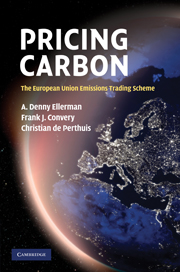Book contents
- Frontmatter
- Contents
- List of figures
- List of tables
- List of boxes
- List of appendices
- Frequently used abbreviations
- Preface
- 1 Introduction
- 2 Origins and development of the EU ETS
- 3 Allowance allocation
- 4 Effects of free allocation
- 5 Market development
- 6 Emissions abatement
- 7 Industrial competitiveness
- 8 Costs
- 9 Linkage and global implications
- 10 Conclusions
- Annex: The interaction between the EU ETS and European electricity markets
- Appendix A Sequence of events in the development of the EU ETS and Linking Directives
- Appendix B Data tables
- Bibliography
- Index
5 - Market development
Published online by Cambridge University Press: 05 July 2011
- Frontmatter
- Contents
- List of figures
- List of tables
- List of boxes
- List of appendices
- Frequently used abbreviations
- Preface
- 1 Introduction
- 2 Origins and development of the EU ETS
- 3 Allowance allocation
- 4 Effects of free allocation
- 5 Market development
- 6 Emissions abatement
- 7 Industrial competitiveness
- 8 Costs
- 9 Linkage and global implications
- 10 Conclusions
- Annex: The interaction between the EU ETS and European electricity markets
- Appendix A Sequence of events in the development of the EU ETS and Linking Directives
- Appendix B Data tables
- Bibliography
- Index
Summary
Introduction
In market-driven economies, giving parity of esteem to environmental endowments means introducing market prices for these assets that reflect their scarcity. Once the appropriate prices are in place, those who use these endowments have continuing and automatic incentives to use them parsimoniously and to find new and less expensive ways of doing so.
Thus, a critical issue in any cap-and-trade approach is whether this market price develops and whether participation in the market is broad enough to support the assumption of least-cost attainment of the environmental goal. These questions are particularly important when the facilities concerned are endowed with free allocations of allowances. In the case of free allocation, agents may not recognize the opportunity cost of using a freely allocated allowance to cover emissions and may simply consider their allocations as so many commands from the regulator to limit emissions to a specified level or to pay a required penalty. Facilities endowed with more allowances than their emissions would feel no need to abate and would simply surrender the required number of allowances and disregard the remainder. Facilities endowed with fewer allowances than needed to cover emissions would abate but only to the level of their allocation, or to the penalty price level, whichever would lead them to incur a lower marginal cost. In the absence of a market, this behaviour would be rational, but the marginal abatement cost (MAC) would vary and the environmental goal would not be achieved at least cost.
- Type
- Chapter
- Information
- Pricing CarbonThe European Union Emissions Trading Scheme, pp. 122 - 157Publisher: Cambridge University PressPrint publication year: 2010



